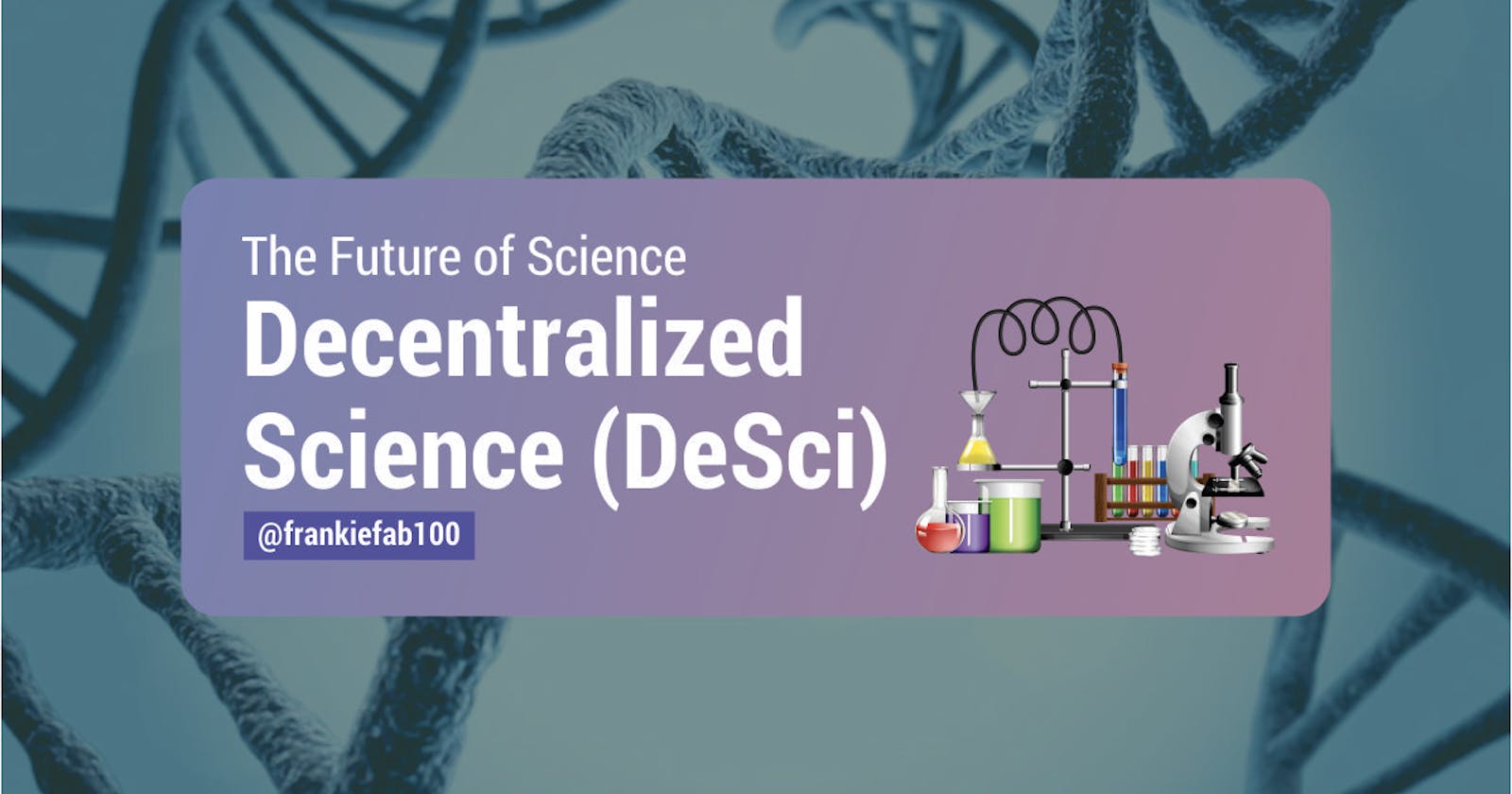The Future of Science: What You Need to Know About Decentralized Science (DeSci)
What is DeSci? How Decentralized Science is changing the landscape of scientific research
The Decentralized Science (DeSci) ecosystem aims to provide new approaches to today’s science while also allowing individuals to get involved in the process of scientific advancement.
In this article, you will learn about decentralized science, factors limiting science and scientific research, some examples of DeSci projects, and how blockchain technology will revolutionize scientific work.
Let’s dig into this!
What is Decentralized Science?
Decentralized Science, commonly referred to as “DeSci,” is a movement that utilizes blockchain technology as a tool to improve scientific research.
It is creating new mechanisms for funding to advance science away from the control of biased, profit-driven publishing institutions that make decisions on funds or the publication of research projects.
It aims to ensure open-source research to create a more democratic and equitable scientific system that is less susceptible to censorship and control by central authorities. DeSci wants to foster an environment where unconventional ideas can thrive by making funding, scientific tools, and data more widely available.

The Objectives of Decentralized Science
To ensure an open, decentralized, and collaborative research process among scientists around the world.
To ensure transparency in research review and publication.
To alter the way scientific research is funded.
To ensure free and open access to academic papers and research data for the advancement of modern science.
To ensure democratized ownership of research intellectual properties.
Factors limiting science and scientific research
Over the years, major issues in the conventional research process have been copyright, patents, trademarks, and intellectual property (IP). The DeSci movement aims to improve research funding, foster innovations, and encourage collaborations among scientific researchers.
Without further ado, let’s see some of the problems with today’s science:
1. Insufficient funding
Because research grants are so extremely competitive, researchers feel under pressure to publish even when their results are flawed.
These grants pay for immediate costs like tools, supplies, and incentives, which restrict long-term research but promote the exploration of novel subjects that are frequently required to appease funders.
By giving grants to organizations rather than to individuals, DeSci hopes to address the problem of numerous researchers bidding for a small number of grants.
2. Lack of information sharing
According to a study by BioScience in 2014, scientists infrequently share their individual data sets publicly online due to competition. Research experiments and knowledge are often kept behind paywalls, and negative results go unpublished, leading to duplicated efforts.
Validating previous findings is often overlooked, and major research journals prioritize new studies with clear methods unless they contradict earlier findings. DeSci aims to increase accessibility to scientific knowledge.
3. Biased journal publication
Scientists face many challenges such as being hampered by information overload, misinformation, fees, poorly designed navigation, and a loss of browseability. The only way for scientists to share their findings and knowledge is by publishing journals or articles. Most academic publication processes can take over a year from the time of submission, peer review, and publication. Publishers tend to go for eye-catching studies that can sell many copies. Science researchers forego more critical issues for attention-grabbing ones that are likely to be published and generate more profit.
4. Poorly designed studies
The current scientific research system prioritizes results over the validity of findings. In order to secure funding, researchers devote considerable time to grant proposals and pitches, which can cause them to prioritize producing positive results over the quality of their research. Unfortunately, science journalism often contains sensationalized claims designed to attract grant funding.
To address this problem, DeSci believes that research methodology should be given greater attention and prioritized over misleading claims. Instead of focusing solely on results, DeSci advocates for a new system in which research publications are evaluated based on the quality of the experimental design, methods, and conclusions. To prevent any manipulation of results, the experiment design and method will be stored on the blockchain. Researchers will be recognized for their contributions to science rather than simply for publishing papers.
5. Poor review process
The system for reviewing scientific research does not currently employ double-blinded peer reviews, and prior to publication, research is frequently not shared with other subject-matter experts for constructive criticism.
By implementing double-blind peer reviews, DeSci seeks to reduce the publication of fairly mediocre research and reduce bias in the review process, by ensuring the name or affiliation of the author(s) and reviewers are unknown to both parties through the use of zero-knowledge proof (ZKP).
Now that you understand the concept of DeSci and its goals, it is time to learn about some of the popular DeSci projects.
Notable Web3 Projects in the DeSci Movement
A number of web3 protocols and initiatives have emerged since the inception of the DeSci movement. Some of them are as follows:
Molecule
Molecule is a decentralized biotech protocol, that builds a web3 marketplace for research-related intellectual property. It is a new biotech marketplace for IP-NFTs and scalable frameworks for biotech DAOs to democratize biopharma research and drug development. This platform connects academics and biotech companies with quick and easy funding while enabling patient, researcher, and investor communities to directly govern and own research-related intellectual property.
It is creating collaborative ecosystems, where stakeholders in drug development can work together to expedite the process of bringing novel therapeutics to patients. And also transform pre-screened projects and intellectual property into liquid and easily investable assets in form of NFTs.
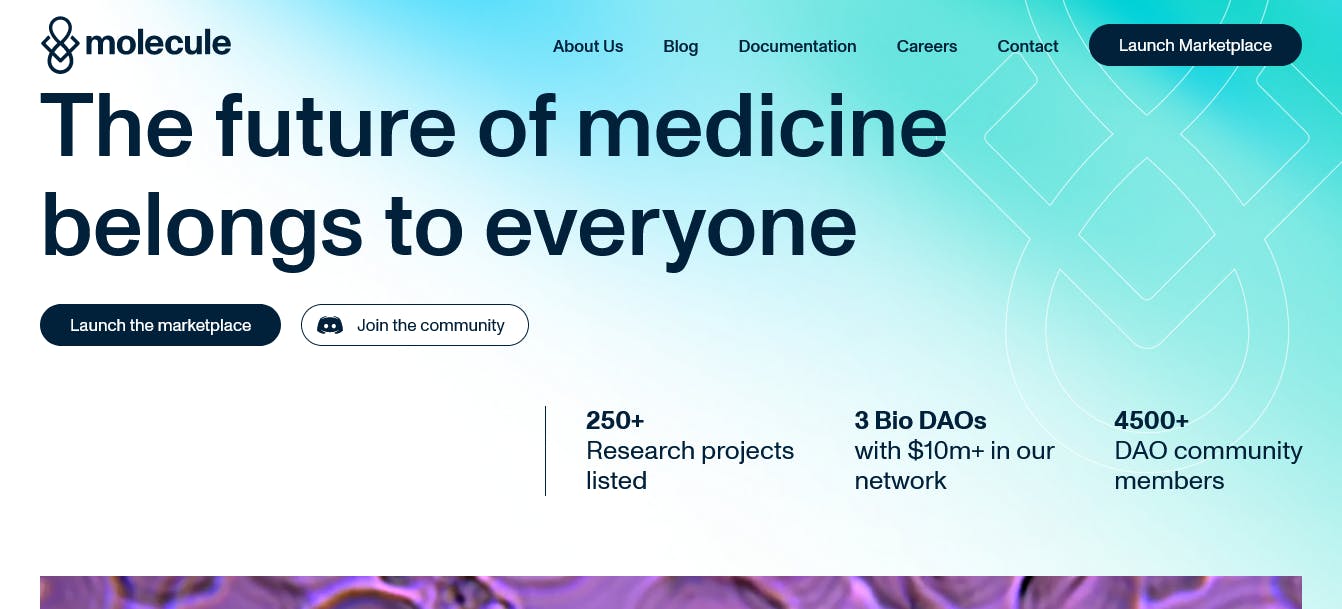
VitaDAO
VitaDAO is a decentralized autonomous organization collective for community-governed and decentralized drug development. The aim is to fund and digitizes research in the form of IP-NFTs. Anyone can join to support and finance new therapeutics and research data in the longevity space.
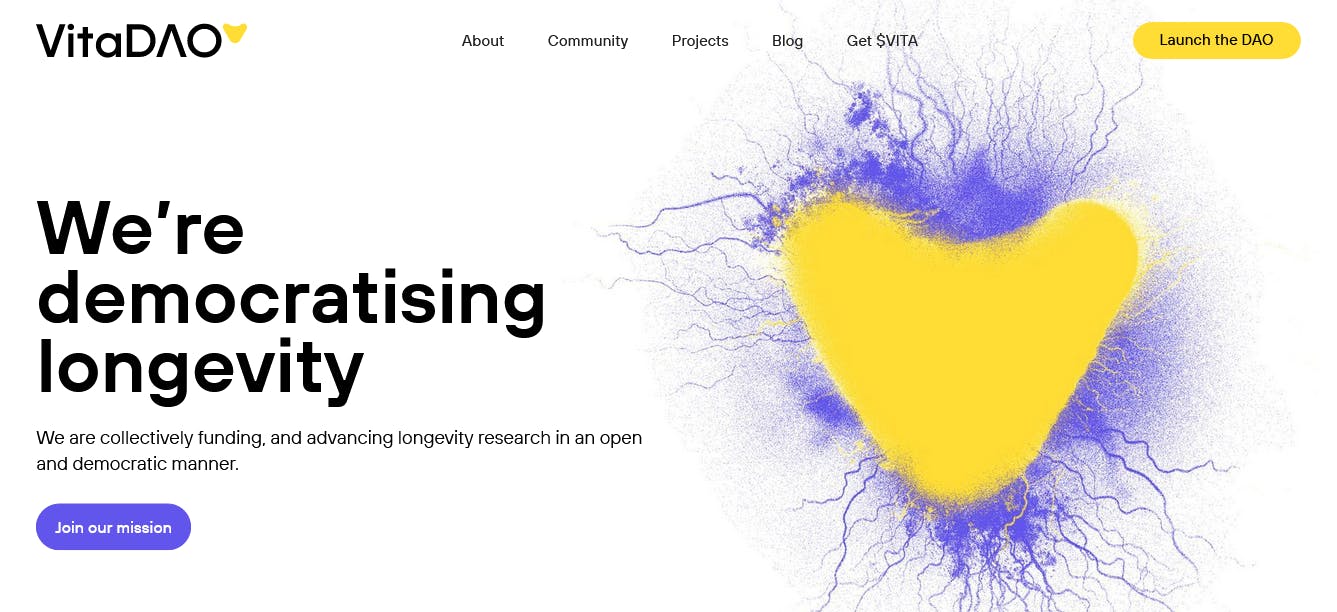
AthenaDAO
AthenaDAO is a decentralized collective that leverages blockchain to fund women’s reproductive health research and drug discovery. It is focused on helping female researchers with company formation and access to community and capital to truly increase diversity in biotech, and create a token for women to get involved in a cause that matters to them.
It aims to address underfunded research in female reproductive health and access to reproductive health by using blockchain technology to raise capital via token sales to fund research, drug development programs, and innovations.
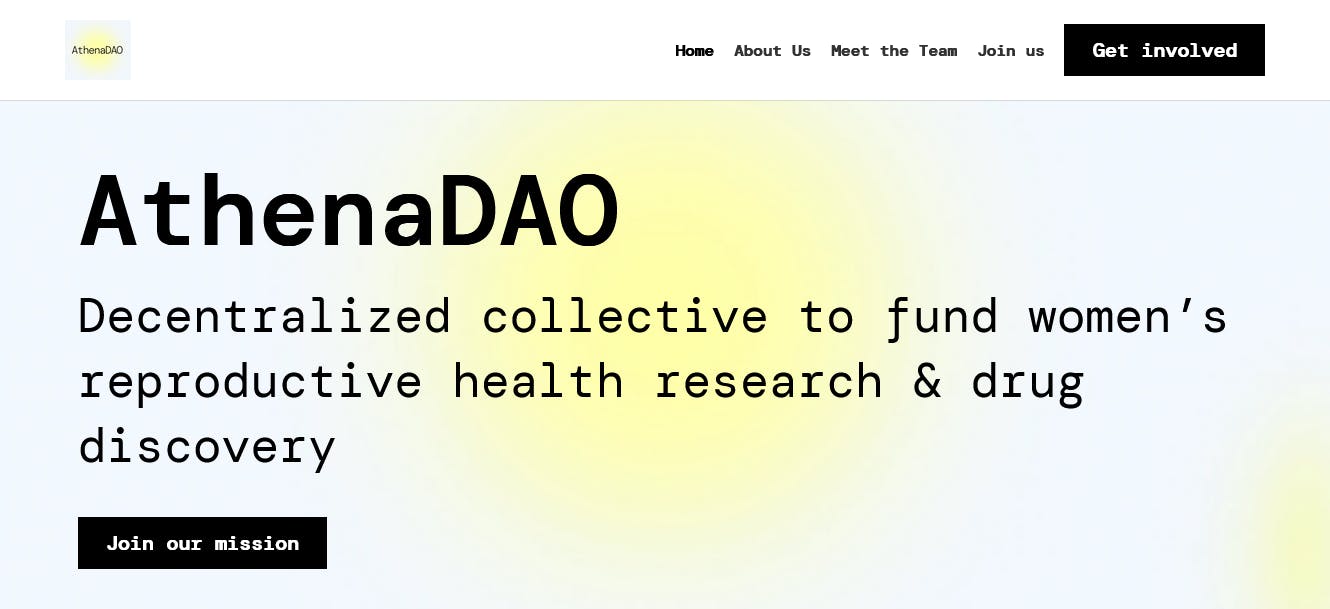
Research Hub
Research Hub aims to accelerate the pace of scientific research with the goal of creating a platform where people can collaborate on scientific research in a more efficient way, similar to what GitHub has done for software engineering.
Within ResearchHub, researchers can upload articles in PDF form, summarize the findings of the work in an attached wiki, and discuss the findings in a completely open and accessible forum. Community contributors are incentivized with ResearchCoin (RSC) for uploading new content to the platform or participating in research discussions.
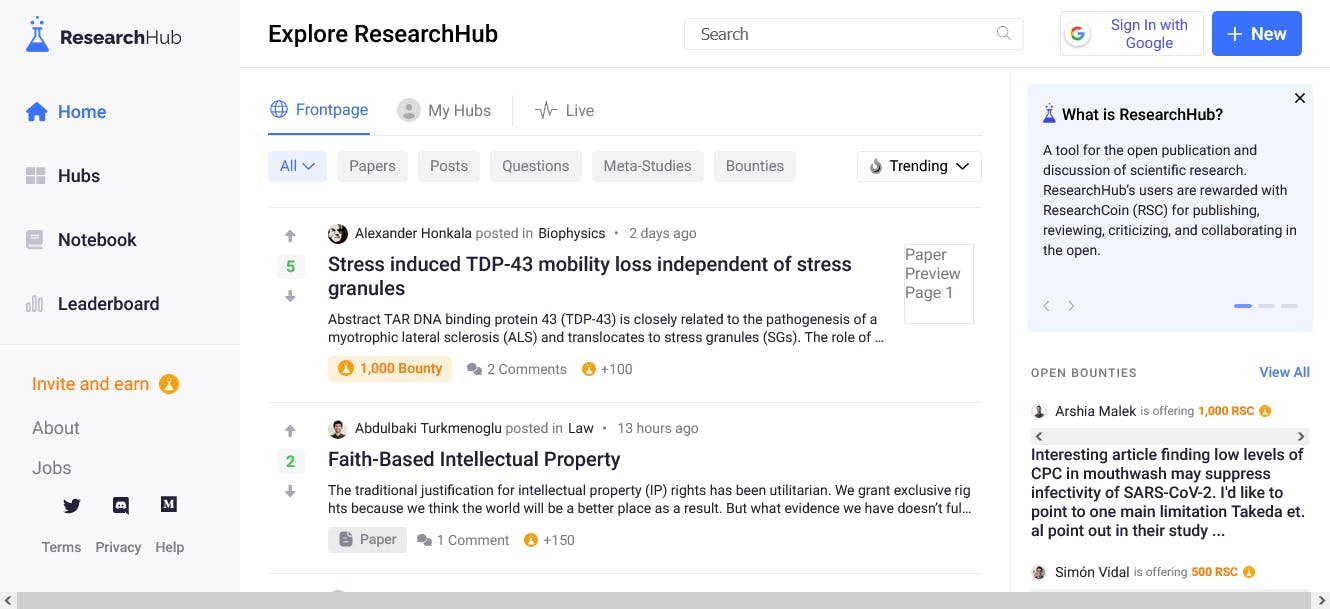
Decentralized Science
An open and transparent platform for peer reviews of research works. It encourages independent collaboration between research authors and reviewers with reliance on scientific journals or any third party. It allows scientific research reviewers to be recognized and compensated for their contributions and as well reduces the cost and time spent on publication processes. Where;
Reviewers' work will be recognized.
Editors will find the best peer reviewers of the field of interest.
Researcher can earn verifiable credits as NFTs for their project.
OpScientia
OpScientia is a community of open science activists, researchers, organizers, and enthusiasts with the goal to solve the problems of data sharing, reproducibility, incentive alignment, coordination, and intellectual ownership that affects science today.
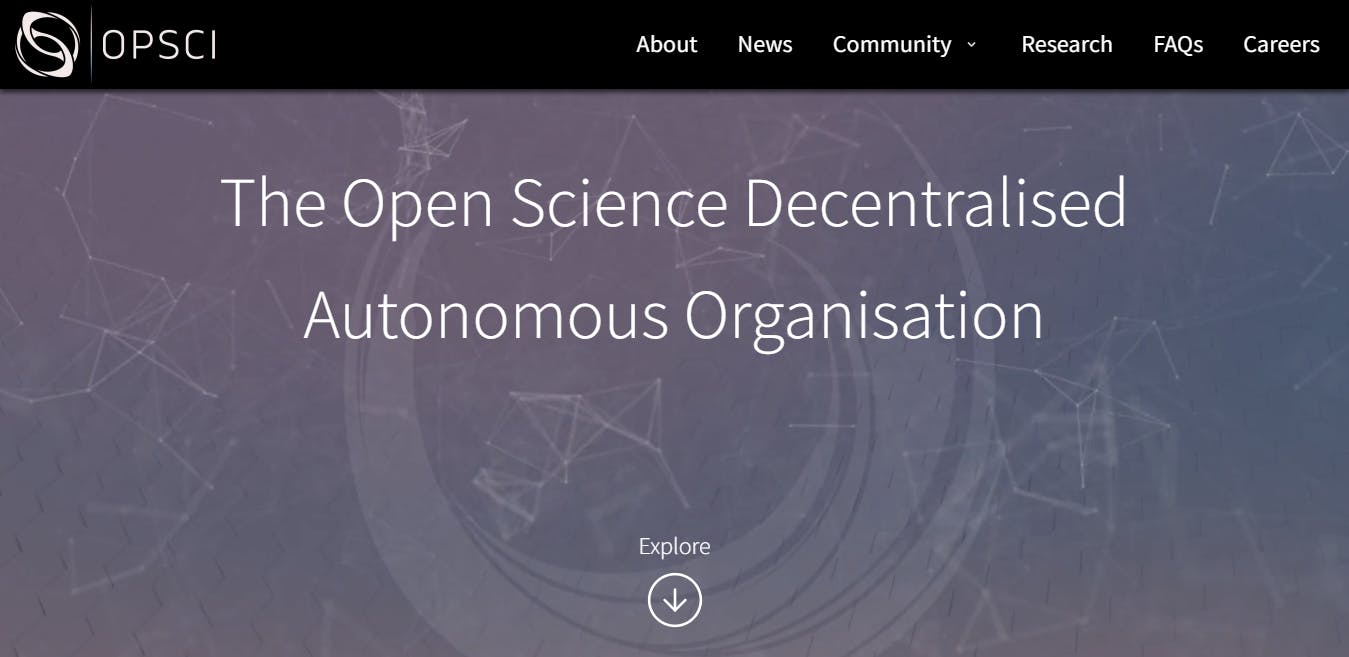
BioDAO
BioDAO is a global biotech economy with the goal to build and empower a community of biotech innovators that have a reliable funding source for the ecosystem and democratized access to talent. Members can contribute, complete tasks, and gain new skills relevant to the process of drug discovery and translation.
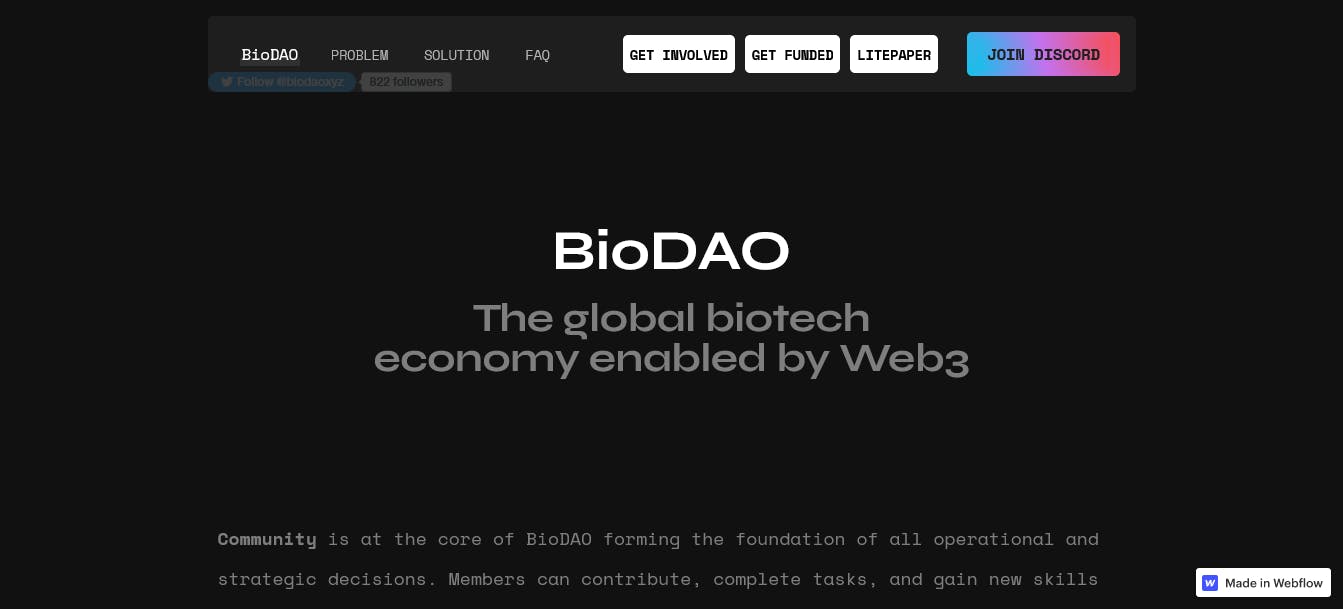
DeSciWorld
DeSciWorld's mission is to ensure unrestricted, unbiased, uncensorable research and maintain transparency and accountability in science. enables and supports those that want to decentralize science. With the platform, a scientist can improve outreach for their work, grow networks, access resources from a huge and vibrant community and even apply for funding.

DeSci Labs
DeSci Labs empowers scientific societies and builds tools to enable scientists to form autonomous research communities (ARCs) that create public transparency about the peer-review, and selection processes and perform scientific validation by operating on DeSci Nodes. ARCs are sovereign, owned and controlled by their members, equipped with tools to raise money, and governance power to decide how to allocate funds to their members.
It aims to reform how scientific discoveries are shared which usually slows down scientific progress. The DeSci Nodes combine IPFS with decentralized indexing to store scientific knowledge as interoperable computational objects for generations. For each uploaded manuscript, DeSci Nodes creates an inventory of research artifacts, an incentive system for replication, a mechanism for validation, and a connection point embedded into your preprint. Content storage on DeSci Nodes for scientists is community-sponsored.
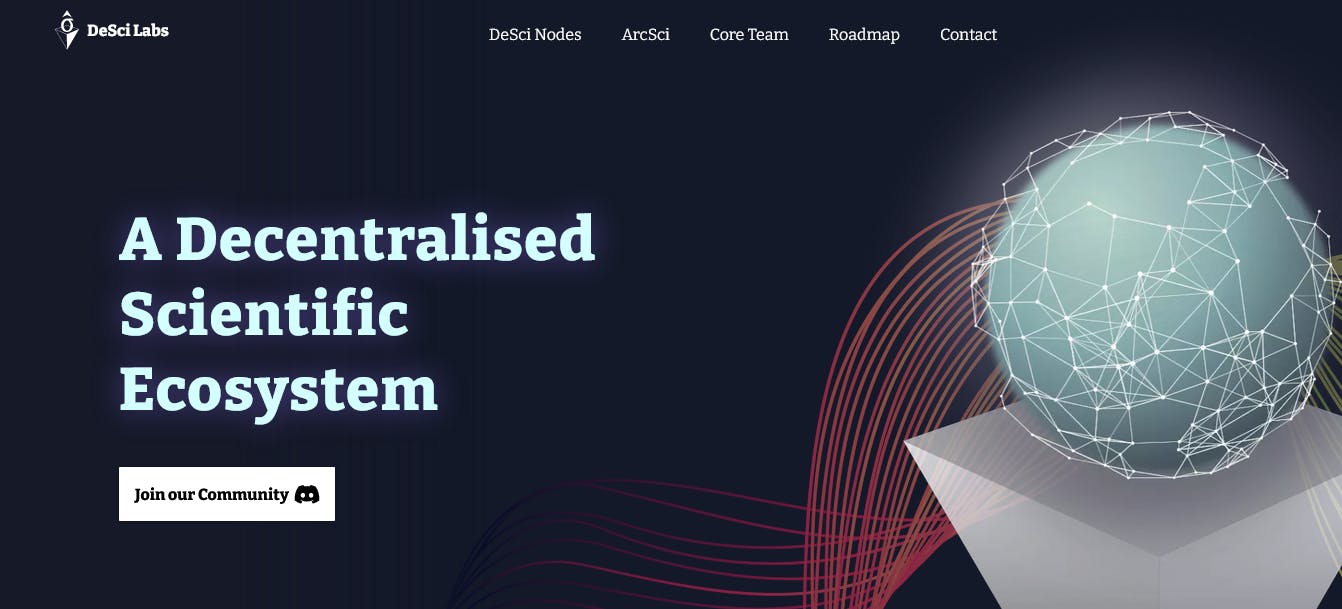
DeSci Foundation
The Desci Foundation is an independent organization of leading scientists and innovators dedicated to exploring the potential of applying new technologies, incentives, processes, and funding models to the scientific ecosystem. Their mission is to support the development of a more verifiable, open, and fairer ecosystem for science and scientists. And also guide and support the development and implementation of new ways to enable high-quality and replicable science.
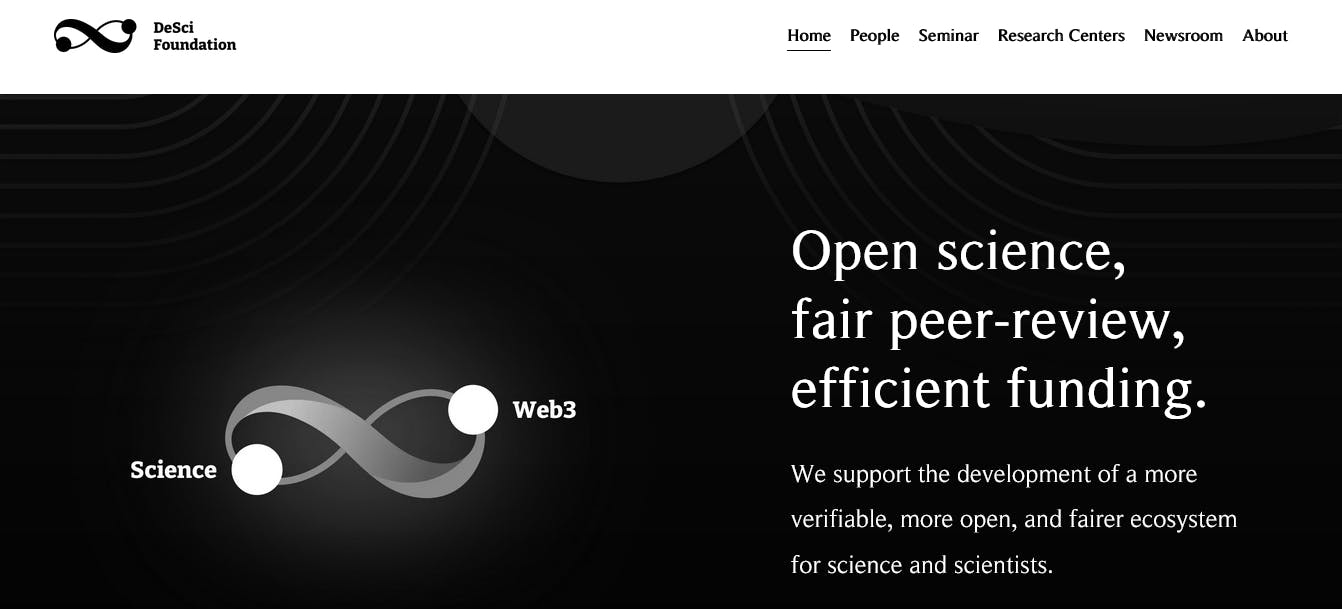
HairDAO
HairDAO is a decentralized autonomous organization dedicated to advancing research and development for hair loss treatments in an open-source and democratic way. It is a patient-owned, open-source, global, and mission-driven corporation with the goal of providing better, more readily available current solutions to androgenic alopecia while investing all profits into longer-term research and companies that will make hair loss a problem of the past.
The HAIR governance token is a central component of the HairDAO ecosystem which aligns incentives among DAO contributors and grants token holders rights to participate in governance and decision-making within the DAO.
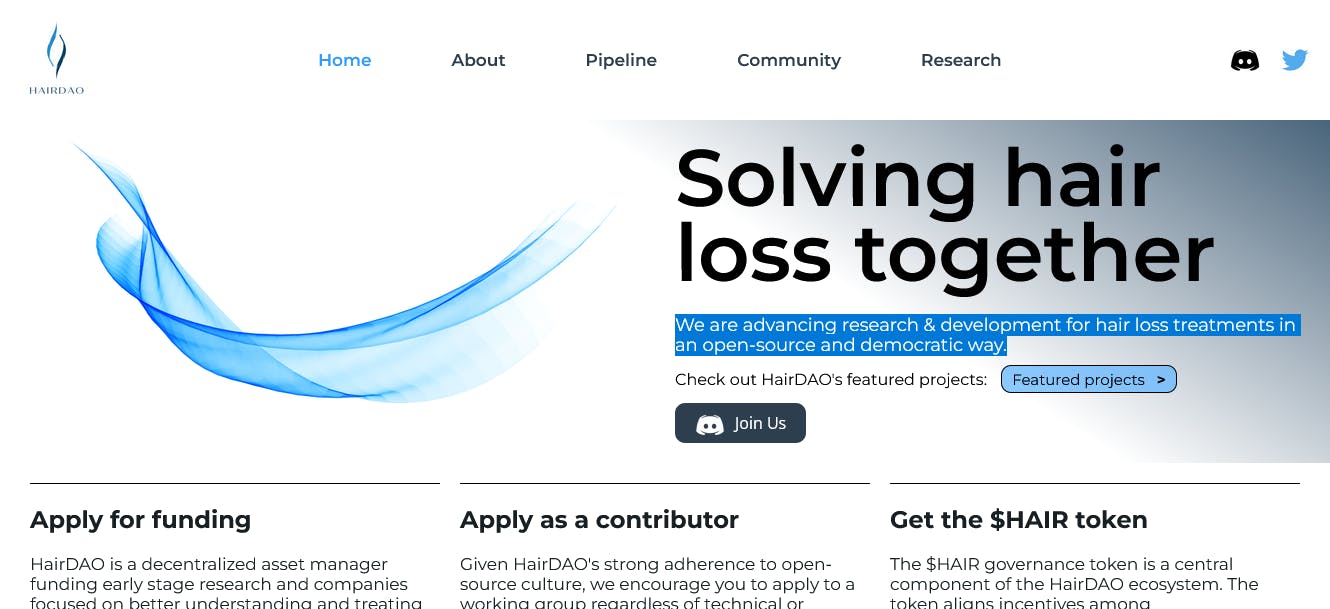
NeuraDAO
NeuraDAO aims to bring back ownership of cutting-edge neurotech to the people who need it most, and accelerate the future of neurotech research and development. It is also focused on building a direct bridge between consumers of research, the members of NeuraDAO, and researchers to speed up innovation and scale in the neurotech space.
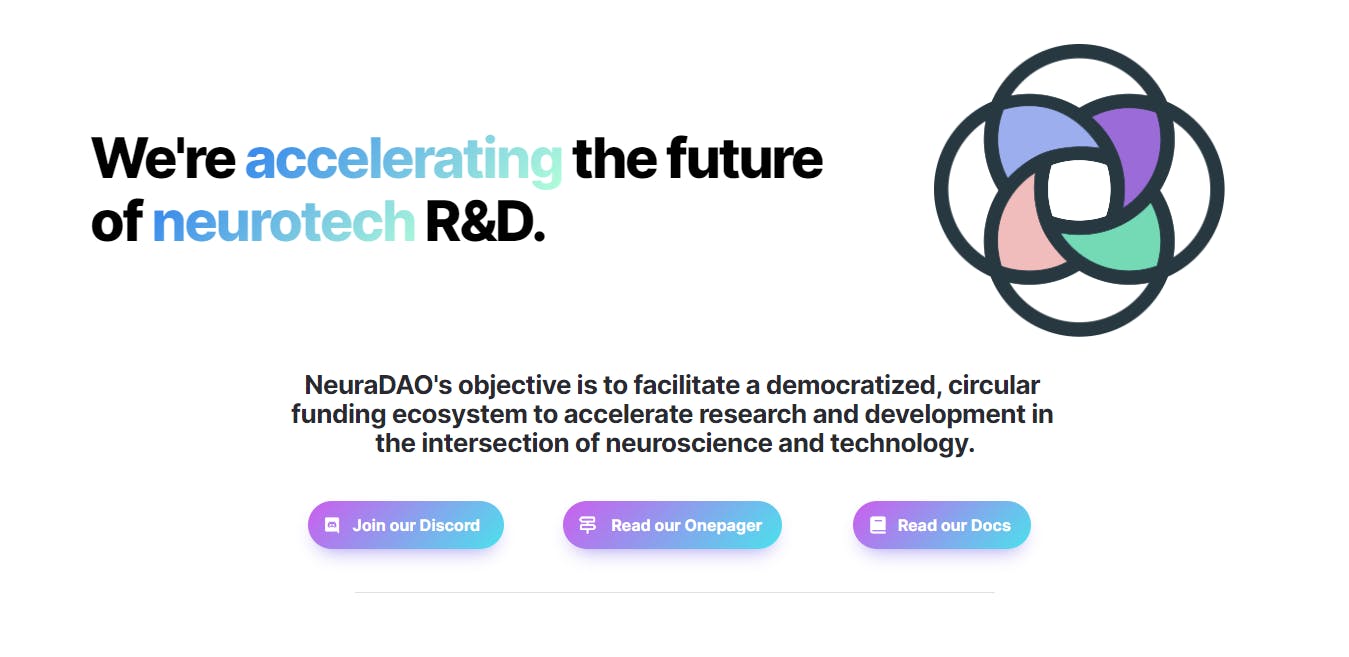
ValleyDAO
ValleyDAO is an open, global community collectively financing and democratizing access to synthetic biology technologies to protect the future of our planet. It is focused on creating a democratized bio-economy and supports climate synthetic biology to combat negative climate impacts. As a community-owned collective, it provides funding and value to researchers by voting using the proposed $GROW governance token.
They incubate academic and independent research projects to help researchers maximize the impact of their work by taking their research results beyond the bench and into the real world through a streamlined application process.
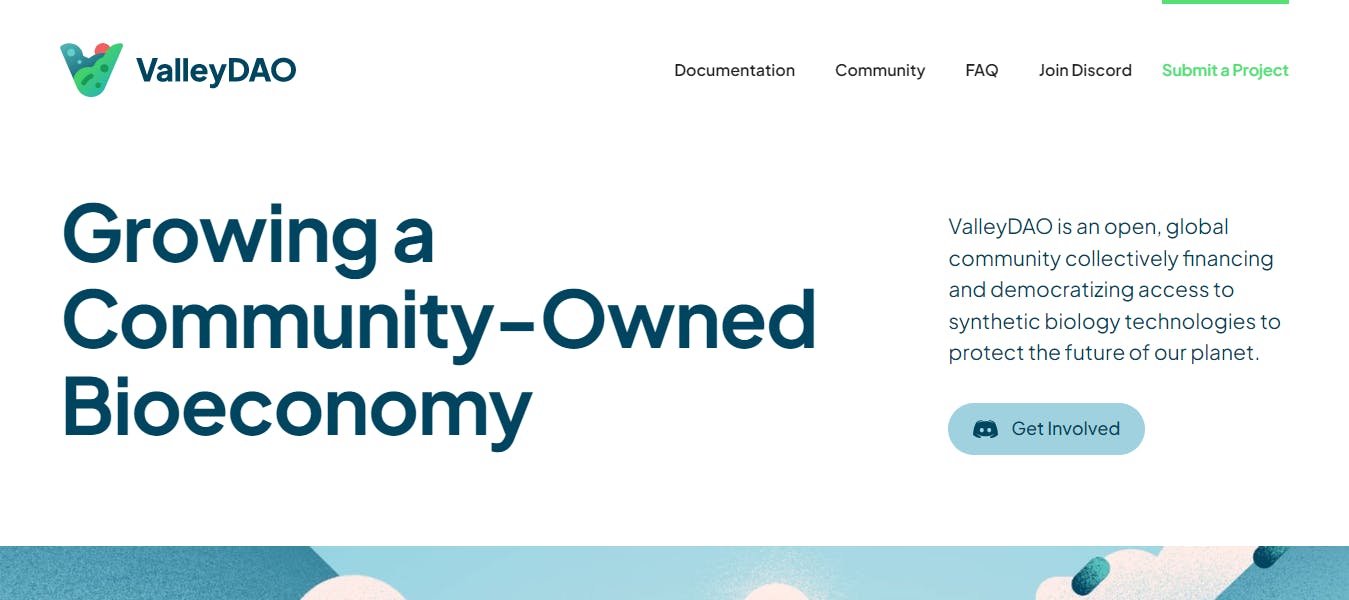
MedDAO
MedDAO's mission is to create a decentralized global community and protocol with the primary mission of distributing medical knowledge without boundaries and barriers of intermediaries. It provides incentives and systems for a global, distributed medical knowledge network leveraging a highly-engaged community of public health stakeholders who are co-owners of the organization.
It is focused on leveraging blockchain to put ownership back into the hands of individuals, to ensure Physicians reclaim ownership of their practice of medicine and patients reclaim ownership of their healthcare journey and participate in a global healthcare community. This helps increase the confidence of patients, industry participants, and physicians when it comes to making serious medical decisions.
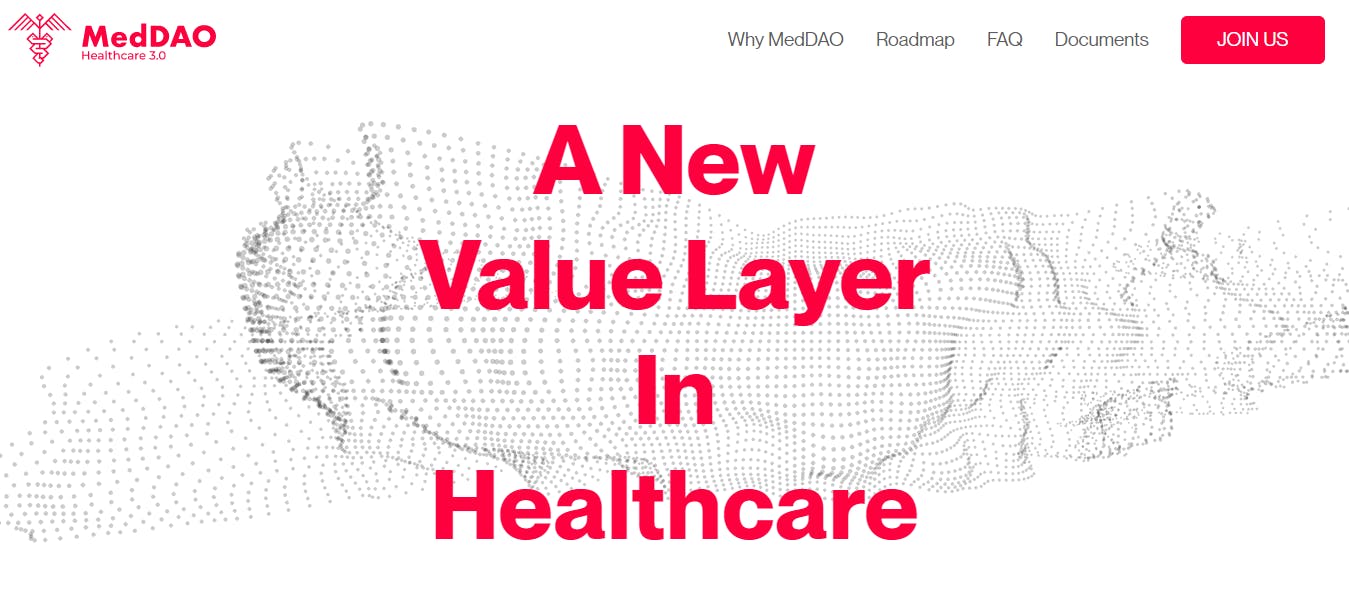
PsyDAO
PsyDAO is a Psychedelics Research decentralized organization with the goal of funding research at the intersection of psychedelics and mental health. PsyDAO is a decentralized autonomous organization dedicated to the sustainable and ethical advancement of psychedelic medicines. PsyDAO aims to fund and democratize early-stage psychedelic research and IP through the use of tokenized community governance.
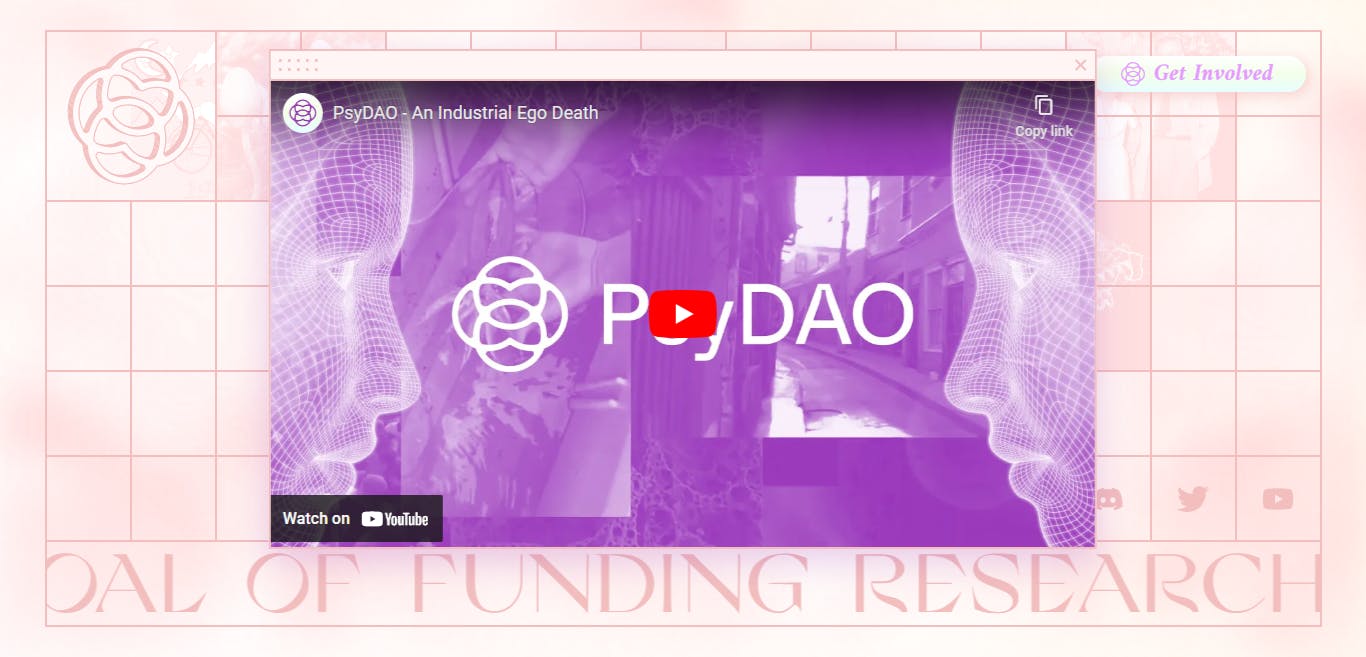
Fleming Protocol
The Fleming Protocol is an open-source data economy that fuels collaborative biomedical discovery by incentivizing patients or hackers to work with labs, scientists, and academia.
They provide the infrastructure for patients to store all of this data in one place using IPFS as our decentralized data storage solution, giving users full custody and control of their data. For example, our infrastructure will give patients the autonomy to develop automated and personalized systems for self-management. We also envision that the patient data will form the basis for a new personalized healthcare economy in the metaverse, all whilst preserving patient privacy and security.
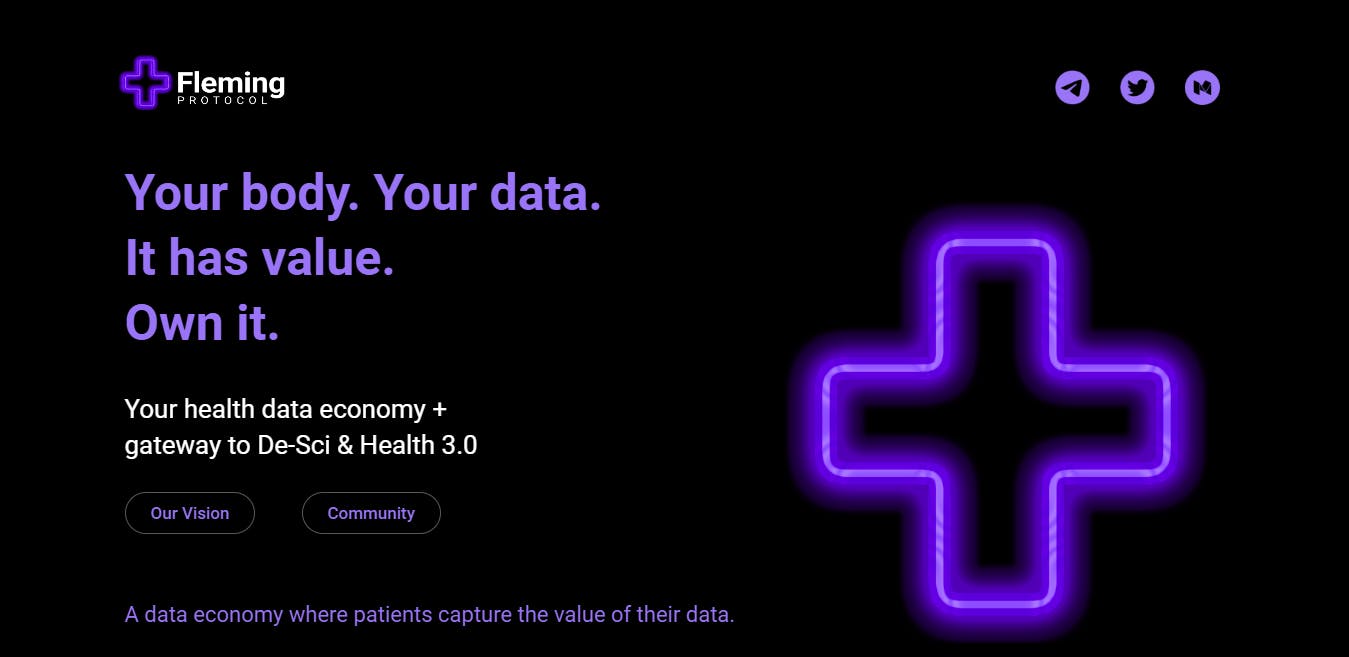
Disclaimer: This content is for informational purposes only and is not investment advice. You should consult a qualified licensed advisor before engaging in any transaction.
Closing Thoughts
There is no doubt that DeSci is still in its infancy, but in a few years, a large percentage of scientific research will evolve through the application of blockchain technology. Blockchain technology will revolutionize scientific research by ensuring that scientific theses, citations, and patents are immutable and traceable on the decentralized blockchain network.
For science to be reliable, transparent, and independent, the scientific record should be openly accessible and not hidden behind paywalls. This would enable anyone to reuse the content for any purpose, provided proper attribution is given. However, the current mechanisms for sharing data are opaque, data-gathering methods are unclear, and data is often not replicable.
Hopefully, you now have a thorough understanding of the Decentralized Science movement and its impact on modern science. To learn more about DeSci and its ecosystem, check out the DeSci Wiki by Dr. Jocelynn Pearl.
If you found this article useful, please share it with others. You can also connect with me on Twitter.
Further Reading
See also:

